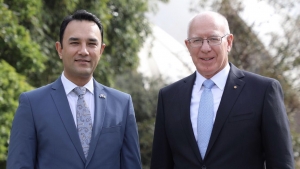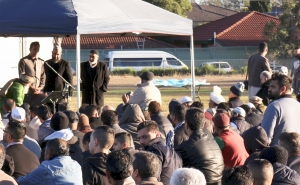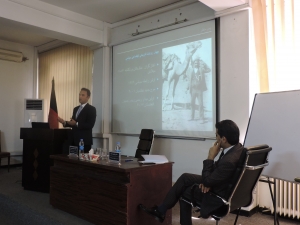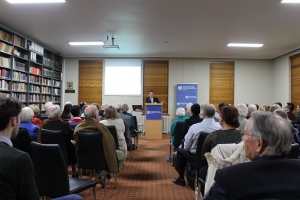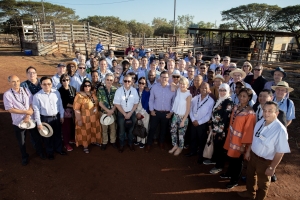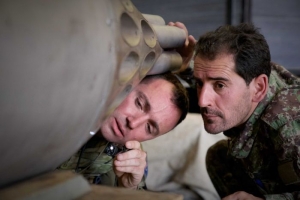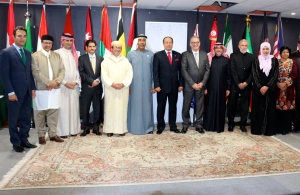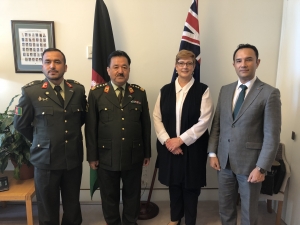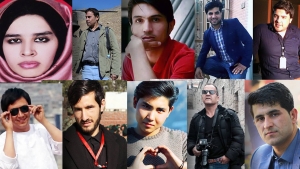Sydeny - HE Ambassador Wahidullah Waissi in his first day of official visit of New South Wales called on HE General the Honorable David Hurley AC DSC (Ret'd) in Government House in Sydeny on 8 August 2018. Both sides discussed current affairs and exchanged views on enhancing cooperation at all possible levels.
Hon David Hurley expressed his best wishes to the government and people of Afghanistan. Ambassador Waissi discussed promoting of business and trade at bilateral level. "This is the only way we can diversify our productive capacity for a sustainable economic growth." He added.
Both Australia and Afghanistan are working to enhance bilateral cooperation on economic development, security and people to people relationship. The first political consultation has took place in Canberra after 48 years of political relations in 2017. The people to people dialougue platform established last year and the Afghan-Australian Parliamentary Friendship Group inaugrated at the Parliament House last December.
Governor of the New South Wales, Hon David Hurley, reiterated his government's cooperation to the aforementioned committments and extended his support to the current and upcoming events particularly in NSW.
Sydney, 15 June 2018 - On the occasion of Eid-ul Fitr, Ambassador Wahidullah Waissi has offered Eid prayers together with thousands of Afghans and other Muslims across New South Wales in Blacktown city of Sydney.
Ambassador Waissi before prayers addressed his remarks to attendies and wished them a happy and prosperous Eid together with their family and friends. The main purpose of Eid after a month long fasting is about solidarity, friendship and empathy.
Kabul, 27 June 2018 - The Institute of Strategic Studies of Afghanistan's Ministry of Foreign Affairs has invited Ambassador Wahidulla Waissi to adress to Diplomats and students of Diplomacy Institute about key areas of bilateral relationship between Afghanistan and Australia and areas of enhancement and future cooperation.
Ambassador Waissi spoke about history and current affairs of Australian-Afghanistan Relationship and discussed the areas of cooperation on security and military, economic development, cultural including sports and people to people contact. He highlighted the important outcomes since March 2017 and since the President of Islamic Republic of Afghanistan, HE Mohammad Ashraf Ghani visited Australia on 4-5 April 2017.
In 2018-19, the Australian Government will provide an estimated $80.2 million in total Official Development Assistance (ODA) to Afghanistan, including an estimated $80.0 million in bilateral country program funding managed by DFAT.
On 8 May 2018, Foreign Minister Bishop announced a new approach to humanitarian funding for Afghanistan and Pakistan, meeting the Prime Minister's 2016 UN Refugee Summit commitment to support refugees and internally displaced peoples and host communities. Protracted conflict and instability in the region has created one of the largest humanitarian crisis with over 15 million people in need of assistance in 2018.
Australia's aid program in Afghanistan focuses on achieving three strategic objectives, as outlined below and detailed in the DFAT Afghanistan Aid Investment Plan 2015-18.
Objective 1: Supporting the Afghan Government to maintain economic growth and institute more effective and accountable governance
Objective 2: Empowering women and girls by addressing barriers to their social, political and economic participation
Objective 3: Building resilience and supporting at-risk populations
A new Aid Investment Plan, under development at the time of the Australian Aid Budget Summary's publication, will govern Australian aid in 2018-2020. The new Aid Investment Plan will set out broad directions and principles for Australian aid, and cover major current commitments.
Melbourne, 22 August 2018 - His Excellecny Ambassador Wahidullah Waissi addressed his keynote remarks on Afghanistan: the way forward to the scholars and practitioners gathered in Melbourne city. The event was organized by the Australian Institute of International Affairs (AIIA) Victoria branch.
Since the fall of the Taliban in 2001, Afghanistan has made strides in reversing the effects of international isolation and rebuilding its institutions, weakened after decades of external interference and ensuing violence.
The international community has provided political and economic assistance during this period, with the aim of helping Afghanistan to re-emerge as a self-sufficient and stable state.
In April 2017, Afghan President Mohammed Ashraf Ghani visited Australia, marking the first ever visit by an Afghan President. Australia reaffirmed its commitment by pledging to increase the level of security and economic cooperation with Afghanistan.
What does the future of Afghanistan look like? What are the main influences and who are the main actors shaping this future? What role will the Australia-Afghanistan relationship play in this process? were main areas of Ambassador Waissi's remarks at the AIIA Victoria on 22 August.
Gathered by more than 80 participants, the public speech event of Ambassador Waissi was warmly welcomed at the AIIA.
The Invictus Games is an international adaptive multi-sport event, created by Prince Harry, in which wounded, injured or sick armed services personnel and their associated veterans take part in sports including wheelchair basketball,sitting volleyball, and indoor rowing. Named after Invictus, Latin for "undefeated", the purpose of the event is how the power of sport could help wounded warriors physically, psychologically and socially.
The first Invictus Games took place in March 2014 at the Queen Elizabeth Olympic Parkin London, United Kingdom. The opening ceremony was attended by Prince Harry, then-Prime Minister David Cameron, and Frederik, Crown Prince of Denmark among others.
The second games opened on 8 May 2016 at Walt Disney World, near Orlando, Florida, United States. The opening ceremony was attended by Prince Harry, First Lady of the United States Michelle Obama, former U.S. President George W. Bush and many other dignitaries. The 2017 games were held in September in Toronto, Canada.
The 2018 games will be held from 20-27 October in Sydney, Australia. The 2020 games are scheduled to be held in The Hague, Netherlands.
Invited Countriesfor Invictus Games Sydney 2018 are Afghanistan, Australia, Canada, Denmark, Estonia, France, Georgia, Germany, Iraq, Italy, Jordan, Netherlands, New Zealand, Poland, Romania, Ukraine, the United Kingdom and the United States.
Afghanistan has been represented at previous games by teams of less than 10 competitors but compete enthusiastically and proudly nonetheless. Last year in Toronto, Afghanistan’s team won its first medals, a silver and bronze and were presented the “Best Team” award for 2017.
For the Invictus Games Sydney 2018, eight Afghan wounded warriors were selected to represent their country from a field of more than 40 competitors at NATO’s Resolute Support headquarters during the national qualifier. The Afghan competitors who will advance to Sydney include: Aba Jan, Abdul Hanan, Abdul Waheed, Abdul Wali, Aminullah, Ryaz, Saifurahman and Sohail.
The quota of 5 as Nations Guest has been determined based on Afghanistan’s current team size to support and cheer them during competitions. The following privileges have been recently included for all Nations Games Guests:
General admission seating for all sporting sessions including Prime Event Access (PEA) sessions – i.e. Finals for Wheelchair Basketball, Wheelchair Rugby and Sitting Volleyball; Access to Opening Ceremony; and Access to Closing Ceremony.
Access to the above events will require a complimentary ticket to be presented on entry. Accreditation itself will not provide access to Prime Event Access (PEA) sessions, Opening Ceremony or Closing Ceremony.
Access to Hospitality will remain a buy-in for Nations at $250 per day and include breakfast, lunch, afternoon refreshments/snacks and beverages. Hospitality will conclude each day at approximately 6pm. Australian International Military Games (AIMG) is solely responsible for organizing the Invictus Games Sydney 2018.
Afghan Media based in Australia (particularly in Sydney) and beyond can get accredited via the following link: https://www.invictusgames2018.org/invictus-games-2018/media-centre/media-accreditation-application-form
Ambassador Wahidullah Waissi, together with a delegation of 70 Canberra-based Ambassadors and High Commissioners visited the Northern Territory, Darwin from 5-6 July 2018.
Foreign Minister, Hon Julie Bishop hosted this two days event by showcasing Northern Territory business, tourism and investment opportunities.
"The 2-day visit was an opportunity to promote internationally the dynamic Northern Territory (NT) economy. Members of the Diplomatic Corps met local leaders in government, business and academia, and identify trade and investment opportunities for their home countries." Said by Foreign Minister Bishop.
The group also visited leading agricultural research facilities, Beatrice Hill Buffalo Farm and Coastal Plains Research Farm, where breeding programs and innovations in agricultural and horticultural research are helping local producers expand their yields.
The diplomats also treated to the Darwin's wildlife with an opportunity to view crocodiles in their natural habitat.
Ambassadors also visited the Charles Darwin University (CDU) and interacted with the researchers. The delegation visited the CDU Centre for Indigenous Knowledges, Leadership and Education that is helping to build economic and social identities for Indigenous Australians.
The delegation also had a tour of the National Critical Care and Trauma Response Centre to view Australia's rapid response capabilities for health emergencies across Australia and South East Asia. The program also included a harbour view tour of the Ichthys LNG Project, one of the world's most significant oil and gas mega-projects, and a visit to Larrakeyah Barracks, to visit first-hand Australia's military assets and capabilities.
Northern Territory Chief Minister Michael Gunner hosted a trade and investment event for local businesses to promote their products and services directly to the diplomatic delegation.
Australia will assist the Afghan National Air Force to establish its UH-60 Blackhawk helicopter capability.
Minister for Defence Senator the Hon Marise Payne made the announcement while attending the NATO Leaders’ Summit in Brussels.
Australia will provide around 20 Australian Defence Force (ADF) personnel, including aviation advisers and force protection, who will help Afghanistan develop its Blackhawk capability. This will be managed within Australia’s overall commitment of around 300 ADF personnel.
“Australia is one of only a few nations in the international coalition currently flying Blackhawks and we will be able to provide qualified personnel to support the introduction of this important platform,” Minister Payne said.
“The Blackhawks are a critical battlefield enabler that will provide the Afghan National Defense and Security Forces with increased air mobility and response capabilities for ground forces.”
“Australia will also continue to fund the sustainment of Afghanistan’s current fleet of Mi-17 helicopters as it transitions to the Blackhawk through the Afghan National Army Trust Fund.”
Australia remains the second largest contributor to the Afghan National Army Trust Fund, and has contributed US$520 million since 2010.
“Since 2001, Australia has remained steadfast in its support to Afghanistan. Our additional contribution reflects the importance we place on supporting the Afghanistan government and its efforts to further peace and reconciliation,” Minister Payne said.
“Australia remains committed to working with NATO and its partners to support the Government of Afghanistan to provide security and stability for its people and to prevent the spread of terrorism.”
Photo credit: ABC News
Members of the Organization for Islamic Cooperation (OIC) diplomatic missions in Canberra, hosted an Iftar reception at the Canberra Islamic Center on 7 June 2018. Members of the Diplomatic Coprs, Ambassadors, Canberra authorities, men and women across Canberra were invited for this big Islamic countries' gathering.
Embassies presented food and their cultural artfacts to demonstate their rich side of the culture and society while offering Iftar for all participants.
Canberra - The Afghan delegation comprising of Deputy Defence Minister, Lt. General Iqbal Ali Naderi and Lt. Colonel Sayed Hasib Sediqi, together with the Afghan Ambassador to the Commonwealth of Australia, HE Wahidullah Waissi, met with Senator the Hon Marise Payne, Minister for Defense of Australia at her office in the Parliament House on 22 May 2018.
Both sides discussed enhansing defence and security cooperation in the areas of military education, women empowerment and equipment. "Australia will remain committed to a stable and secure Afghanistan and continues to support the NATO-led train, advise and assist mission called Resolute Support." Defense Minister Payne said. She also emphasised on her government's committment to support Afghanistan on the battle against international terrorism. She reiterated support for increasing the number of students at the Australian military colleges.
Lt. General Naderi thanked the Australian government for their support through the Resolute Support mission and for the military education opportunties provided for Afghan students. He discussed enhansing military education for Afghan femal cadets.
Two Afghan cadets already studying at the Australian Royal Military College (RMC) Duntroon in 2018-2019. Afghanistan will have more students at the Australian Command and Staff Course (ACSC) and Center for Defence and Strategic Studies (CDSS) for the years 2018 and beyond.
Around 300 Australian Defense Force (ADF) members from the Royal Australian Navy, the Australian Army, the Royal Australian Air Force and Defence civilians are deployed in Afghanistan as part of Operation HIGHROAD. ADF personnel perform in a variety of specialist and advisory roles as embeds within Headquarters Resolute Support in Kabul; the Train Advise Assist Command – South in Kandahar and Train Advise Assist Command-Air in Kabul. ADF embeds work with members of the coalition, Afghan National Defence and Security Forces (ANDSF), ANDSF and Afghan security ministries to assist in institutional capacity building within the Afghan security institutions.
Ambassador’s Message on World Press Freedom Day 2018
Today, May 3, 2018 marks the World Press Freedom Day. Freedom of Press has been one of the key pillars of democracy in Afghanistan. Since 2001, the government of Afghanistan has been committed to protecting the freedom of press. Media including press plays a vital role, through neutral reporting, is not only sharing information but also bringing changes in political, social, economic and cultural areas.
Afghanistan has achieved major milestones since 2001. Currently, the country has more than 55 local TV channels, around 170 radio stations, 1500 newspapers, and thousands of printing presses; the majority of which are owned by the private sector.
In 2015, the Government established an Oversight Commission on Access to Information, and in 2017 launched a National Strategy on Access to Information. According to UNESCO’s 2017 ranking, Afghanistan is ranked forth in terms of freedom of media among 13 South Asian and Central Asian countries. Similarly, Reporters Without Borders Organization labeled Afghanistan as one of the most accountable governments to media.
A significant portion of credit related to press and media achievements in Afghanistan goes to its brave journalists and reporters, without whom Afghanistan would not be standing where it is today. They have been in the frontline. The recent inhumane terrorist attack on journalists on Monday 30 April 2018 in Kabul and Khost, which took the lives of 10 competent, dedicated and young professional journalist is an evidence of their sacrifice towards freedom of expression and press. Unfortunately, around 100 journalists and reporters have lost their lives, while on duty, since 2001 in Afghanistan.
While I strongly condemn the killing of journalists in recent attacks and brutal and heartless attacks on our civilians, I should reassure that the Government of Afghanistan is committed to protecting the journalists and reporters and will continue to support them and the freedom of press.
Wahidullah Waissi
Ambassador


